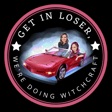
Episode 175: The Complete Folk Herbal with Rebecca Beyer
Welcome back, Witches! This week, we’re joined by a very special guest—Rebecca Beyer! We’re chatting all about her upcoming book The Complete Folk Herbal, diving into the roots of Folk Herbalism, and celebrating the magic of the plants that connect us to the land and our ancestors. So get in, Loser, we’re talking herbs, history, and the healing power of the green world.
We would be forever thankful if you left our podcast a 5-Star review. If you really loved the show and want more Get in Loser content, check out our Patreon, Supercast, & Buy Me a Coffee links below. You can also find us on Facebook, Twitter and Instagram @GetinWitches, on TikTok @weredoingwitchcraft, or email us at weredoingwitchcraft@gmail.com. You can support our show through our links below.
Patreon: patreon.com/GetinWitches
Supercast: https://getinloserweredoingwitchcraft.supercast.com
Buy Me a Coffee: https://www.buymeacoffee.com/getinwitches
Music by Karl Casey @ White Bat Audio- The Witch
References:
Beyer, Rebecca. The Complete Folk Herbal (2025).
